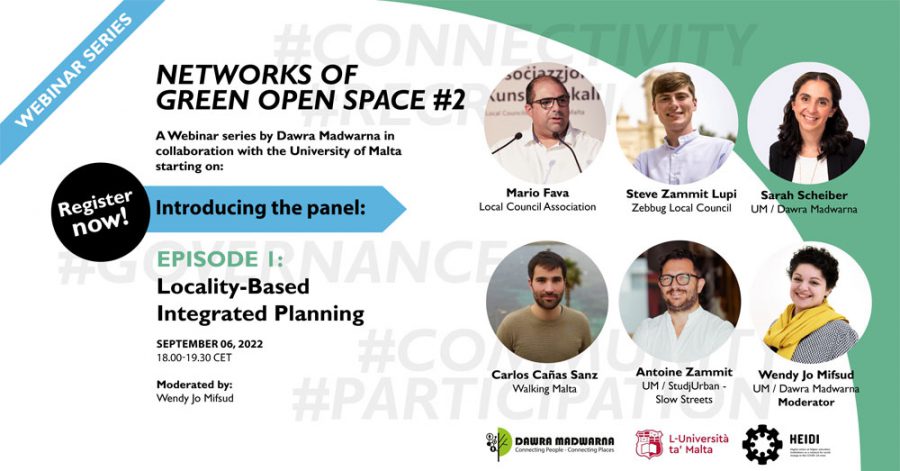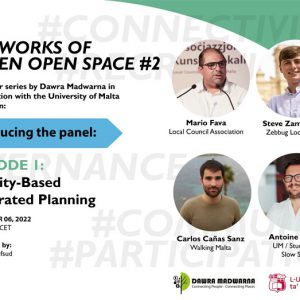Activities
Networks of Green Open Space – Webinar #2 | Episode 1
The fourth webinar of the series Networks of Green Open Space was held on the 6th September 2022. Moderated by Wendy Jo Mifsud, the webinar sought to emphasise the importance of an integrated approach to spatial planning, that is carried out in recognition of the many layers that constitute urban space. The issue of complex environments is not new to this series of webinars, but it is one that is critical to creating spaces that are responsive to their users. Throughout the webinar, it was made clear by the panelists and other participants, that it is only by considering the many aspects of space in an integrated manner that a positive experience of space can be achieved.
The panelists for this webinar hailed from governmental bodies, private practice and the University of Malta. Dr Sarah Scheiber, a lecturer and specialist in green space planning represented the University and Dawra Madwarna. Dr Antoine Zammit from StudjUrban featured the Slow Streets Action Plan and was joined by Mr Mario Fava from the Local Council Association in speaking of the future implementation of slow streets. Mr Steve Zammit Lupi represented the Żebbug Local Council and spoke of Pjazza Pedonali, an initiative which he is organising in Żebbug. Finally, Mr Carlos Canas Sanz spoke of ‘Walking Malta’ a digital application he designed as a planning support tool to help promote active mobility in dense urban areas.
The importance of local and regional authorities in driving change in the built environment was highlighted, taking the Slow Streets Action Plan as an example, insofar as it was developed as a collaborative effort related to one of the four pillars of the Residents First Strategy. Challenges notwithstanding, the experience of Pjazza Pedonali shows that there is an overall positive outcome, that ensued in part from a ubiquitous backing by members of the Żebbug Local Council. Integrated planning and collaboration between stakeholders thus go hand-in-hand, and can be a powerful means of driving positive change and changing people’s attitude to the appropriation of public spaces.
Taking collaboration a step further, and bridging the divide between the physical and virtual space, the use of the ‘Walking Malta’ digital application showed the potential of allowing users of space to give feedback on the quality of street, open spaces and other features of the urban environment. Designed as a research framework and a tool for gathering data in a bottom-up manner, ‘Walking Malta’ attracted more than a hundred interventions from the public until the time the webinar was held. The richness of this data can lead to significant re-interpretations of what people notice about places and what they want to experience. It was in fact stated that there is a wealth of opportunity for Local Councils in the use of digital applications to empower residents to have a say in their environment.
A valid point was made about the importance of data sharing by companies which intrinsically gather data from users about how they use roads or how they feel about waste collection for example. Should this information be shared and made available for use by researchers and other analysts, it can lead to a series of tactical urbanism projects that will test whether or not an intervention is accepted by the public. It has been proven that the initial reluctance to accept change can be easily overcome once people experience betterment in their public spaces, this leading to an enhancement of their quality of life, whether through a more active lifestyle on the one hand or even through increased fellowship that better designed spaces promote.
Watch the recording on our Youtube Channel here.

